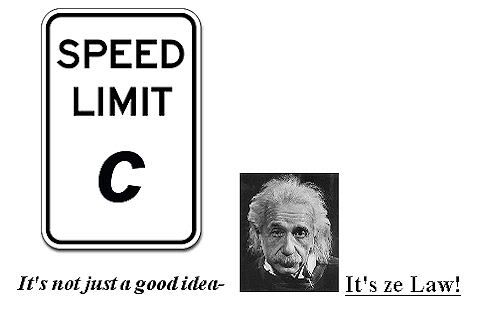
Posted on 04/05/2009 10:41:09 AM PDT by Ernest_at_the_Beach
In this centennial year of Albert Einstein's revolutionary theories of space, time, and gravity, humanities scholars say that his influence extended far beyond science.
Time is a nebulous thing, except maybe for lunchtime. That's a lesson from The Hitchhiker's Guide to the Galaxy, the science-fiction romp by Douglas Adams that was thrown into Hollywood's Infinite Improba bility Drive and emerged as an early-summer movie hit.
Consider the elaborately imagined history of the Guide itself, and of its various editors. We learn that one Lig Lury Jr., hired by a publishing consortium operating from a chunk of celestial real estate called Ursa Minor Beta, "never formally resigned his editorship--he merely left his office late one morning, and has never returned since. Though well over a century has now passed, many members of the Guide staff still retain the romantic notion that he has simply popped out for a sandwich and will yet return to put in a solid afternoon's work." In these mysterious circumstances, all subsequent editors have been designated acting editors. And Lig's desk is still preserved the way he left it, with the addition of a small sign that says "LIG LURY JR., EDITOR, MISSING, PRESUMED FED."
Time moves on, for this particular high-velocity editor. Yet time stands still from the perspective of the cohorts he left behind. So it goes in a universe of relativity.
This year is the centennial of Albert Einstein's so-called miracle year, of which relativity was a big piece. At the age of twenty-six, Einstein published one paper demonstrating that electromagnetic radiation is composed of discrete energy units and setting the stage for quantum mechanics; another that, in looking at random motion, provided experimental support for the existence of atoms and molecules;
(Excerpt) Read more at dukemagazine.duke.edu ...
fyi
btt
One of the biggest problems with this article is that it is based on a fallacy of clarity, that is a fallacy of accent. The concept of relativity is only part of Einstein's theory. In fact, he originally intended to name his theory invariance theory. The most important part of his theory is that the speed of light is constant, a universal constant. But he gave in to pressure from professional physicists to call it relativity theory. At the time Einstein was not a professional physicist. He was an amateur working as a clerk in the Swiss post office handling patent claims.
Newtonian physics uses Galilean relativity: space and time are absolute, but the speed of light is relative. In Einstein's physics, space and time are relative, but the speed of light is absolute. So if anyone ever tells you that Einstein proved that everything in the universe is relative, please point out fallacy. The speed of light is not relative; it is a universal constant. E = mc2. In that equation c is the speed of light. (The first letters of the alphabet are used for constants in algebraic formulas.)
For the world that most people live in, Newtonian physics gives the correct results. Relativity only comes into play when you are traveling near the speed of light. And since my car does not go that fast no matter how hard I press down on the accelerator, I don't worry much about relativity.
But of course science fiction is a lot of fun to read. There you can imagine that your car can travel near the speed of light. But the purpose of the imagination is not to take it literally. The purpose of the imagination is to give you a vacation from a literal world.
H/T to HardOCP for link at post #5.
fyi

Einstein may have been ‘unemployed’ in his chosen field but he was never an amateur.
An amateur is someone who engages in an art, science, or athletic activity as a pastime rather than a profession. When Einstein wrote his first paper on special relativity, he was indeed an amateur. But it took an amateur to explain the constant speed of light that professional physicists failed to account for.
Through the centuries, many amateurs have made important contributions to science and mathematics. Do not discount the amateur. Just because a person is not receiving payment for some research does not mean necessarily that that research is invalid.
So, among his accomplishments in physics, we have Einstein to blame for a century’s worth of excreble “modern” art, music and dance? That doesn’t seem quite fair.
And don’t forget all of the successful patent applications he processed.
No, we have modern artists, musicians, and dancers for losing their common sense in thinking that art had to become scientific to remain valid.

· Google ·
Read this piece-of-crap article when it was published and had hoped that it would never see the light of one of my days again.
It's the usual pap of the modernist historians. The same distorted world-view that gives us things like "living documents" (an example of which would be our former Constitution) and a new drug-tested messiah (who now rules us).
Yep, because he was frozen out of the academic world after graduation from the Polytechnic he had to spend about eight years out in the real world examining patents on electromagnetic devices. I believe he has a few patents on improved fridges. His “annus mirabilis” papers gave him entree back into academia.
Disclaimer: Opinions posted on Free Republic are those of the individual posters and do not necessarily represent the opinion of Free Republic or its management. All materials posted herein are protected by copyright law and the exemption for fair use of copyrighted works.